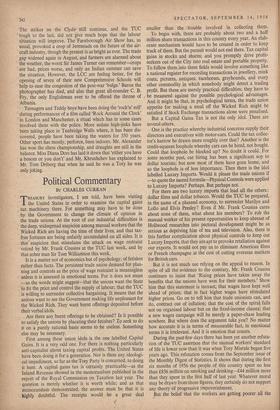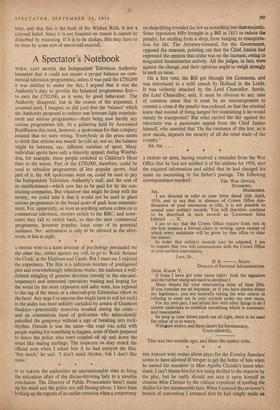Political Commentary
BY CHARLES CURRAN
rpREASURY investigators, I am told, have been visiting 1 the United States in order to examine the capital gains tax machinery there. For something may have to be done by the Government to change the climate of opinion in the trade unions. At the root of our industrial difficulties is the deep, widespread suspicion among manual workers that the Wicked Rich are having the time of their lives, and that tax- free fortunes are being unfairly accumulated on all sides. It is this suspicion that stimulates the attack on wage restraint voiced by Mr. Frank Cousins at the TUC last week, and by that sober man Sir Tom Williamson this week.
It is a matter not of economics but of psychology; of fetishes rather than facts. The persistent trade union demand for plan- ning and controls as the price of wage restraint is meaningless unless it is assessed in emotional terms. For it does not mean —as the words might suggest—that the unions want the State to fix the price and control the supply of labour; that the TUC is willing to surrender collective bargaining. It means that the unions want to see the Government making life unpleasant for the Wicked Rich. They want burnt offerings deposited before their verbal idols.
Are there any burnt offerings to be obtained? Is it possible to satisfy the unions by placating their fetishes? To seek to do it on a purely rational basis seems to be useless. Something else may be necessary.
First among these union idols is the one labelled Capital Gains. It is a very odd one. For there is nothing particularly anti-capitalist about taxing capital profits. The United States have been doing it for a generation. Nor is there any ideologi- cal impediment, so far as the Tory Party is concerned, to doing it here. A capital gains tax is certainly practicable—as the Inland Revenue showed in the memorandum published in the report of the Royal Commission on Taxation last year. The question is merely whether it is worth while; and as that memorandum demonstrated, the answer must be that it is highly doubtful. The receipts would be a great deal smaller than the trouble involved in collecting them.
To begin with, there are probably about two and a half million share transactions in this country every year. An elab- orate mechanism would have to be created in order to keep track of them. But the pursuit would not end there. Tax capital gains in stocks and shares; and you promptly drive profit- seekers out of the City into real estate and portable property. To follow them into these fields would involve something like a national register for recording transactions in jewellery, mink coats, pictures, antiques, racehorses, greyhounds, and every other commodity in which somebody might detect a trading profit. But these are merely practical difficulties; they have to be measured against the possible psychological advantages. And it might be that, in psychological terms, the trade union appetite for making a meal off the Wicked Rich might be satisfied if Stock Exchange transactions alone were penalised.
But a Capital Gains Tax is not the only idol. There are several others.
One is the practice whereby industrial concerns supply their directors and executives with motor-cars. Could the tax collec- tor's harrow be drawn more roughly over that? Another is the credit-squeeze loophole whereby cars can be hired, not bought. Could that loophole be blocked up? No doubt it could. For some months past, car hiring has been a significant sop to dollar tourists; but now most of them have gone home, and so the loophole is of less importance. Then there is the idol labelled Luxury Imports. Would it please the trade unions if —to quote the sacred formula—Physical Controls were applied to Luxury Imports? Perhaps. But perhaps not.
For there are two luxury imports that lead all the others : dollar films and dollar tobacco. Would the TUC be prepared, in the name of a planned economy, to surrender Marilyn and Lollo and Elvis Presley? Even if Mr. Frank Cousins cares about none of them, what about his members? To rob the manual worker of his present opportunities to keep abreast of Hollwood researches into pectoral development might be as serious as depriving him of tea and television. Also, there is this further complication about physical controls to keep out Luxury Imports, that they are apt to provoke retaliation against our exports. It would not pay us to eliminate American films or French champagne at the cost of cutting overseas markets for British cars.
But it is not much use relying on the appeal to reason. In spite of all the evidence to the contrary, Mr. Frank Cousins continues to insist that 'Rising prices have taken away the benefits that the unions have won for their members.' Show him that this statement is inexact; that wages have kept well ahead of prices; that in fact higher wages have stimulated higher prices. Go on to tell him that trade unionists can, and do, contract out of inflation; that the cost of the spiral falls not on organised labour but on the fixed-income classes; that a new wages campaign will be merely a paper-chase leading nowhere. But where does the argument take you? No matter how accurate it is in terms of measurable fact, in emotional terms it is irrelevant. And it is emotion that counts.
During the past few days there has been yet another refuta- tion of the TUC assertion that the manual workers' standard of life is lower now than it was when Tory Misrule began five years ago. This refutation comes from the September issue of the Monthly Digest of Statistics. It shows that during the first six months of 1956 the people of this country spent no less than £836 million on smoking and drinking—£44 million more than they spent in the first half of last year. Whatever moral may be drawn from those figures, they certainly do not support any theory of progressive impoverishment.
But the belief that the workers are getting poorer all the
time, and tha,t this is the fault of the Wicked Rich, is not a rational belief. Since it is not founded on reason it cannot be disturbed by reasoning. If it is to be shaken, this may have to be done by some sort of emotional exercist.



































 Previous page
Previous page